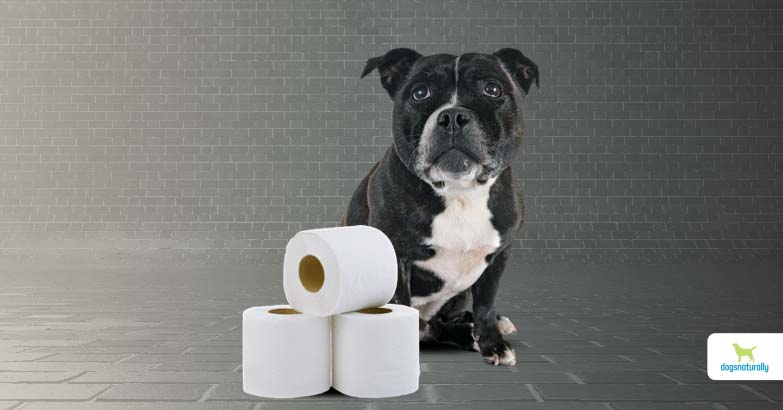Dealing with dog diarrhea can be a distressing experience for both you and your furry friend. This common problem in canines can range from a mild, one-off occurrence to a symptom of something more serious. Understanding the symptoms and causes of diarrhea helps maintain your dog’s digestive health for a lifetime.
Let’s look at why dog diarrhea happens and how to effectively treat it. From dietary adjustments to herbal aids, we’ll guide you through gentle yet effective solutions to manage this uncomfortable condition, ensuring your pooch gets back to their happy, healthy self in no time.
Understanding Dog Diarrhea
Before you can consider how to treat diarrhea, it’s important to first take a look at what diarrhea is, the symptoms and what causes dog diarrhea.
Normal Digestion and Diarrhea
Understanding the differences between normal dog digestion and diarrhea in dogs requires a look into your dog’s GI tract, particularly the small and large intestines.
In normal digestion, food travels through the small intestine, where most nutrients are absorbed. The small intestine’s lining is equipped with villi, tiny projections that increase the surface area for absorption. Here, proteins, fats, and carbohydrates are broken down, and essential nutrients are absorbed into the bloodstream. The process is efficient and controlled, ensuring optimal nutrient uptake. During diarrhea, this process is disrupted.
Small Intestinal Diarrhea
In the small intestine, irritation or infection can hinder the ability to absorb nutrients and water efficiently. This can be due to various causes, including dietary indiscretion, infections, or even stress. Instead of being absorbed, water and nutrients pass rapidly through the small intestine to the large intestine.
Large Intestinal Diarrhea
The large intestine, responsible for absorbing water and electrolytes, also plays a crucial role in forming solid waste. In a healthy state, it effectively removes excess water from the stool. But with diarrhea, the large intestine is overwhelmed by the fluid volume from the small intestine. It cannot reabsorb this excess fluid, leading to loose or watery stools.
Additionally, the rapid transit of digestive contents in diarrhea doesn’t allow for the normal fermentation processes by the gut microbiota. This imbalance can further exacerbate digestive upset, leading to more frequent and watery bowel movements.
Acute Diarrhea
Acute dog diarrhea is characterized by loose, watery stools that can be accompanied by vomiting, lethargy, and loss of appetite. Acute diarrhea typically comes on suddenly and lasts only a couple of days. Acute diarrhea is typically caused by a sudden change in diet, stress, bacterial or viral infection.
Chronic Diarrhea and Inflammatory Bowel Disease
Chronic diarrhea is characterized by frequent loose or watery stools that persist for more than a few days. While occasional diarrhea is normal, chronic diarrhea can be a sign of an underlying health issue that could require medical attention.
There are several causes of chronic diarrhea including food sensitivities, viral or bacterial infections, parasites, and underlying health conditions. In some cases, chronic diarrhea can be a symptom of a more serious health condition, such as inflammatory bowel disease or cancer.
Causes of Diarrhea in Dogs
Understanding the various issues that can lead to canine diarrhea is the key to the well-being of your dog’s digestive and overall health. Here’s a breakdown of common causes:
Dietary Changes: Sudden changes in diet or consuming unfamiliar foods can lead to diarrhea. A consistent diet of processed kibble might also make dogs sensitive to new foods or cause food intolerance.
Eating Garbage: Dogs ingesting inappropriate items (rich food, spoiled food, inedible objects) can irritate their gut lining and cause gastritis, especially in dogs with sensitive stomachs.
Bacterial or Viral Infections: Weakened immune systems, often tied to gut health, can lead to infectious diseases like parvo and distemper, with diarrhea being a common symptom.
Parasites: Puppies and dogs with weakened immune systems are susceptible to parasitic infections like roundworms, hookworms, and giardia, which can stress your dog’s GI tract.
Stress-Induced Diarrhea: Changes in environment or routine, such as relocation or family changes, can trigger stress diarrhea in dogs.
Inflammatory Diseases: Conditions like colitis or Inflammatory Bowel Disease can irritate the intestinal tract, causing diarrhea. These can be influenced by factors like parasites and food allergies.
Metabolic Diseases: Issues in organs like the pancreas or liver can disrupt normal digestion and cause diarrhea and even weight loss.
Medications: Certain drugs can imbalance gut bacteria, weakening the immune system and potentially leading to diarrhea. Diarrhea after antibiotics is the most common drug-related cause.
A Guide To Dog Poop Color
Diarrhea is often just an inconvenience, but it can also indicate underlying health issues that need attention, ranging from minor dietary indiscretions to more serious health concerns. While the symptoms of diarrhea are fairly obvious (runny poo), your dog’s poop can tell you a lot about your dog’s diarrhea, how to treat it and when it warrants a vet visit:
- Green Poop: A greenish stool might seem unusual, but it’s often a harmless sign that your dog has been chomping on grass. However, persistently green poop could hint at a gallbladder issue or other digestive problems. It’s best to consult your vet if this color continues, just to rule out any serious concerns.
- Blue Poop: Blue-colored stool is alarming and often indicates ingestion of rat poison. Many rat poisons are dyed blue for safety reasons. If you notice blue poop, it’s a veterinary emergency. Bring a stool sample to the vet if possible for a quick diagnosis.
- Orange/Yellow Poop: Orange or yellow stool often points to liver disease or biliary system issues. The liver plays a critical role in digestion and detoxification. Persistent orange or yellow poop warrants a visit to the vet to check liver function and overall health.
- Red Poop: Red in your dog’s stool, especially bloody diarrhea, may or may not be concerning. It could be due to a minor injury caused by straining, or something more serious like an inflamed intestinal tract or parvovirus. If it’s a frequent occurrence, it’s important to get it checked to rule out conditions like colitis or a gastrointestinal ulcer.
- Black/Tarry Stool: Black or tarry stool can indicate bleeding in the upper gastrointestinal tract. This is a serious symptom that needs immediate veterinary attention. It could be a sign of ulcers or other internal bleeding conditions.
- Gray/Greasy Poop: If your dog’s stool appears gray and greasy, it might suggest a problem with the pancreas, such as pancreatitis. This condition can be acute and painful for your dog, requiring urgent veterinary care.
- White Poop: White, rice-like grains in your dog’s stool are a common sign of tapeworms. These parasites are usually picked up from fleas or contaminated soil and can be treated effectively with deworming medication. White chalky poop can be caused by foods that are high in calcium, including raw diets.
Understanding these variations in stool color and consistency is crucial in identifying potential health issues in your dog. While some conditions may be managed with home remedies, others may require specific veterinary treatments.
When To Go To The Vet
In most cases, mild dog diarrhea is self limiting and isn’t a cause for concern. Simple diet changes and home remedies are usually enough to improve your dog’s digestion. But there are some symptoms you should be aware of because they might indicate a more serious case of diarrhea. The following list should help you decide when to let your vet determine the best treatment option and the underlying cause:
Behavioral Changes: If your dog becomes lethargic, shows pale gums, or cannot keep food and water down along with diarrhea, it’s time to visit your vet.
Blood in the Stool: While occasional streaks of blood can be due to straining or mild irritation, severe bloody diarrhea or black, tarry stools suggest an infection or internal bleeding in your dog’s gut. This situation calls for immediate veterinary attention. If you have puppy diarrhea with blood, this is also a potential emergency as your puppy could have parvovirus.
Appetite Loss: A day or two without eating might be your dog’s way of coping, but prolonged disinterest in food, especially if there’s lethargy, indicates a deeper issue.
Strange Bowel Movement Patterns: Persistent diarrhea over the course of several days can signal serious digestive issues.
Dehydration: If your dog becomes dehydrated from diarrhea, it can damage the kidneys. Gently pinch the skin at the back your dog’s neck: it should spring right back when you release. If it takes a moment to spring back, your dog is starting to get dehydrated.
Special Cases: Puppies, small, or senior dogs, and those with pre-existing conditions (like intestinal parasites, diabetes, Cushing’s disease, or cancer) require early veterinary intervention. Diarrhea can quickly lead to serious complications in susceptible dogs due to rapid dehydration and nutrient loss.
Stay vigilant about these signs and act promptly to ensure your furry friend gets the right care in time.
Natural Treatment Options for Your Dog’s Diarrhea
Let’s try to help you understand what to do if your dog has diarrhea. Treating diarrhea can easily be done at home for most dogs with mild diarrhea symptoms. Here are the key ways to soothe your dog’s digestive tract:
Dietary Solutions
Most diarrhea is caused by your dog’s diet habits, so dietary changes are an important first step to improving your dog’s digestion.
Fasting: Fasting helps resolve diarrhea in dogs by giving their GI tract a much-needed break. When a dog has diarrhea, its gastrointestinal tract is irritated and inflamed. By fasting, you’re reducing the workload on your dog’s gut, allowing it to rest and recover. This dog food break can help reduce inflammation and restore normal intestinal function. If your dog does not naturally fast, withhold food for 12 to 24 hours. However, it is important not to fast puppies, very small dogs, or elderly dogs.
Provide Lots of Water: Hydration is crucial during diarrhea because diarrhea can cause significant fluid loss in dogs. When a dog has diarrhea, he will lost not only water but also essential electrolytes and minerals. This loss can lead to dehydration, which, if severe, can be a health risk. Ensuring your dog has access to clean, fresh water helps replace the fluids lost through diarrhea. Alternatively, you can create a nutritious slurry by blending cooked vegetables with chicken or turkey broth. This slurry is easily digestible and provides essential nutrients.
Introduce Food Slowly: When your dog’s diarrhea has stopped and you see firm stools, you can slowly introduce solid food. Start with a bland diet like cooked chicken breast. Contrary to popular belief, cooked white rice might not be the best food to treat diarrhea in dogs. It’s high in starch and arsenic and provides little nutrition. Chicken will be better tolerated.
Herbal Solutions and Their Benefits
Herbs and foods can carry amazing benefits for your dog and his digestion. Herbs are a safe and effective dog diarrhea home remedy. Here are the top herbs to try:
Pumpkin: Pumpkin is among the best known home remedies. It has a high soluble fiber content, which absorbs excess water in the digestive tract to help firm up loose stools. Additionally, pumpkin can help with overall digestion by promoting a healthy gut environment. Its fiber content encourages the growth of beneficial gut bacteria, further supporting digestive health. When using pumpkin for dog diarrhea, it’s important to use pure, canned pumpkin (not pumpkin pie filling with added sugars and spices) and introduce it in small, controlled amounts to avoid overloading your dog’s digestive system.
Slippery Elm: Slippery Elm helps treat diarrhea in dogs because of its mucilaginous properties. When mixed with water, it forms a gel-like substance that coats the lining of the gastrointestinal tract. This coating provides a soothing effect, reducing irritation and inflammation in the intestines. It also helps slow down the passage of stool through the gut, allowing for better absorption of water, which can normalize stool consistency. Additionally, Slippery Elm contains nutrients that can aid in healing and repairing the digestive tract. It’s gentle and safe for dogs, making it a popular choice for managing mild cases of diarrhea.
Marshmallow Root: Marshmallow root helps manage diarrhea with its mucilaginous content, which is similar to slippery elm. It forms a protective layer on the lining of the digestive tract. This coating reduces irritation and inflammation, particularly in the intestines. Marshmallow root is known for its ability to soothe irritation and provide relief from the discomfort associated with diarrhea. It also helps normalize bowel movements by adding bulk to your dog’s poop. Finally, marshmallow root can support overall digestive health, making it a beneficial natural remedy for dogs experiencing diarrhea.
L-glutamine: L-Glutamine is also beneficial for treating diarrhea. It’s an amino acid that plays a crucial role in the health and growth of intestinal cells. L-Glutamine supports the lining of the digestive tract, aiding in healing and reducing inflammation. It’s particularly useful in cases of chronic diarrhea or when your dog’s digestive system needs recovery and repair.
Probiotics and Gut Health
Probiotics help with dog diarrhea by introducing beneficial bacteria into the gut. These good bacteria aid in balancing the intestinal flora, which is crucial for healthy digestion. Probiotics can help restore the natural balance disrupted by illness, antibiotics, or dietary changes. They also enhance the absorption of nutrients and strengthen the intestinal barrier against harmful pathogens.
According to research, including a study published in the Journal of Veterinary Internal Medicine, probiotics are effective in reducing the duration and severity of diarrhea in dogs. They are particularly useful in managing acute gastrointestinal disorders and can also contribute to overall immune system health due to the significant role of gut health in immune function.
Antibiotics For Diarrhea In Dogs
Recent research has raised concerns about using antibiotics for treating dog diarrhea. Antibiotics can disrupt the delicate balance of the gut microbiome, which is essential for overall health, immunity, and digestion in dogs. Dr Jennifer Granick, an expert in small animal internal medicine, emphasizes that antibiotics should be a last resort for treating dog diarrhea. Instead, she suggests focusing on restoring gut health through diet and microbiome support.
This growing body of research suggests that, in many cases of diarrhea, antibiotics have little or no impact and may even worsen the condition by aggravating the microbiome.
Preventing Diarrhea In Dogs
There are simple changes you can make to improve your dog’s digestive health and lower his risk of diarrhea. This includes:
- Keep Garbage Out of Reach: Prevents ingestion of harmful or spoiled substances that can disrupt the digestive system.
- Avoid Unnecessary Medications: Reduces the risk of side effects that can harm gut health, like antibiotics that disrupt gut flora.
- Use Herbs to Prevent Worms: Natural dewormers can help maintain a parasite-free digestive tract.
- Use Probiotics When Changing Diet: Probiotics help the gut adapt to new foods by balancing the intestinal bacteria.
- Probiotics and Prebiotics: Supports a healthy gut microbiome, crucial for proper digestion and stool formation.
- Reduce Stress: Stress can adversely affect gut health and lead to digestive issues like diarrhea. Managing stress through regular exercise, a stable environment, and mental stimulation is key.
By focusing on these aspects, you can significantly reduce the chances of diarrhea in dogs by promoting a robust and healthy digestive tract.
Conclusion
It’s important to be aware of the causes and symptoms of diarrhea in dogs. By taking preventative measures such as providing a high quality diet, keeping your dog hydrated, and avoiding certain foods, you can help reduce the likelihood of problems with your dog’s poop.
If your dog does develop diarrhea, there are natural remedies such as pumpkin, probiotics, and bone broth that can help alleviate their symptoms. Remember to always consult with your veterinarian if your dog’s diarrhea persists or if you have any concerns about their health. With a little bit of knowledge and care, you can help keep your dog healthy and happy for years to come.
FAQs
Question: What causes diarrhea in dogs?
Answer: Dog diarrhea can be caused by various factors such as dietary changes, bacterial or viral infections, parasites, stress, and certain medications.
Question: How long does dog diarrhea last?
Answer: The duration of dog diarrhea depends on the underlying cause. Mild cases may resolve within a day or two, while severe cases may last for several days or even weeks.
Question: What are the symptoms of dog diarrhea?
Answer: The symptoms of dog diarrhea include loose stool, frequent bowel movements, vomiting, loss of appetite, lethargy, and dehydration.
Question: How can I treat my dog’s diarrhea at home?
Answer: You can treat your dog’s diarrhea at home by providing plenty of water, feeding a bland diet, giving probiotics, and avoiding certain foods. However, if the diarrhea persists or worsens, you should consult a veterinarian.
Question: When should I take my dog to the vet for diarrhea?
Answer: You should take your dog to the vet for diarrhea if it lasts for more than 24 hours, is accompanied by other symptoms such as vomiting or lethargy, or if your dog is a young puppy, senior, or has an underlying health condition.













